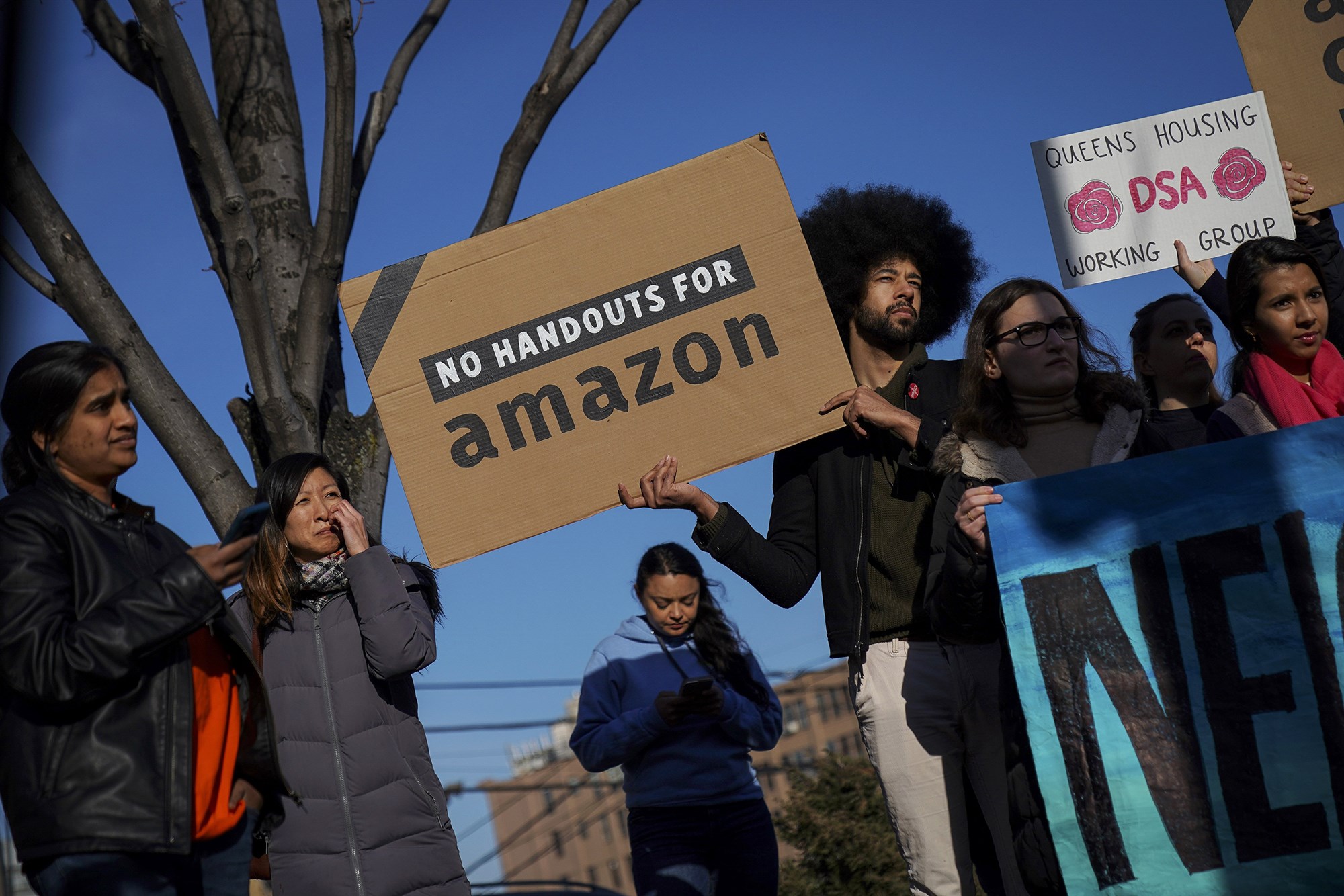NBC News: Amazon pulling out of New York is a victory for New Yorkers. Now Congress should examine its monopolistic actions.

Activists and community members who opposed Amazon’s plan to move into Queens rally in celebration of Amazon’s decision to pull out of the deal on Feb. 14, 2019 in the Queens borough of New York City.Drew Angerer / Getty Images
by Zephyr Teachout, author and law professor | Feb. 15, 2019
People are fed up with big corporations bullying their employees and our elected officials. They’re going to keep fighting back.
The decision by Amazon to stop pursuing $3 billion in financial incentives from New York to locate its “HQ2” in the state was one of most startling corporate about-faces in recent memory, and biggest shows of grassroots power over a massive corporation, a plethora of industry lobbyists and government officials.
Why did it come to this? In short, people are mad as hell and they aren’t going to take it any more.
As a society, we are at an inflection point when it comes to both corporate welfare and monopoly power. Decades of the race to the bottom and corporate subsidies failing to deliver well-paying jobs — just look at the failed FoxxConn deal in Wisconsin or the constant shuffle of low-wage temp jobs in Ellwood, Ill. — have made the typical promises of a corporate welfare deal feel less real. The sheer scope of the Amazon incentive package felt abusive and obscene, especially when the state is facing a $2.3 billion budget shortfall.
Mom and pop shops paying taxes while Amazon got billions just to come to town didn’t seem right, and, post-FoxxConn, people are less likely to fall for the promised jobs numbers. Corporate welfare is finally getting the black eye it always deserved.
Meanwhile, the outsized subsidies offered without New Yorkers’ knowledge or input put Amazon into a situation in which they were suddenly getting daily scrutiny not just into the deal, but into all their business practices. People who never heard that Amazon pursued a contract with ICE for facial recognition software were suddenly hearing about it at work. Workers who use Amazon Prime, but hadn’t realized how anti-union Amazon is suddenly didn’t like what they were hearing. And millions of people who never heard the word monopolies before were suddenly hearing about how Amazon abuses and squeezes its sellers, because the sellers feel have few other options than to use Amazon’s service, or that it takes their customers’ ideas to compete against them. This once much-loved company (last year, it was one of the most loved companies by Democrats) was suddenly being revealed for what it was.
Amazon’s outsized power is looking less and less like smart business and more and more like oppressive politics — one company bullying us all. And the spotlight the deal brought to the company wasn’t good for it overall.
Of course, some of the reason that Amazon pulled out of the deal with New York was purely tactical: They were probably about to lose it anyway. State Senator Mike Gianaris was appointed to the state’s Public Authorities Control Board this month, where he would have veto power over substantial parts of the Amazon subsidy package. Gianaris, who representing the Queens district in which Amazon planned to locate, was an outspoken critic of the deal based on its potential impact on rents and transportation, as well as Amazon’s anti-union, ICE-enabling history.
Gianaris wasn’t accidentally placed on the board by the new state Senate majority leader, and the subsidies weren’t coincidentally under scrutiny: He was placed there because of enormous grassroots opposition to the deal that sprang up almost as immediately as the elected officials behind it made its terms public. Left wing Democrats and Democratic socialists began grassroots organizing in Queens against the deal; stories of Amazon warehouse workers peeing in bottles because of workplace demands weren’t just shared in press releases, but at grassroots meetings. Most of the state’s labor unions were initially opposed to the project, because Amazon wouldn’t commit to union neutrality in New York (though they were hashing out a deal on that immediately prior to Amazon’s pulling out).
So, when Cory Johnson, the New York City Council speaker, grilled Amazon at a hearing in December, he was cheered by hundreds of activists in the balcony carrying “Amazon Lies” banners.
Amazon’s capitulation to those opposed to their expansion in New York City is an epic moment for people power over an enormous corporate bully. But, when you beat a bully, you have to be sure not to let him get away with it somewhere else; this, then, is just the beginning of pushing back on the unfettered growth of corporate power. That same grassroots that demanded an end to a sweetheart deal for a one of the largest companies in the world will be part of the demand for a congressional hearing into Amazon’s near-monopolistic powers.
Amazon overstepped in New York, and we’re not going to let the scrutiny into its actions fade just because it steps back.